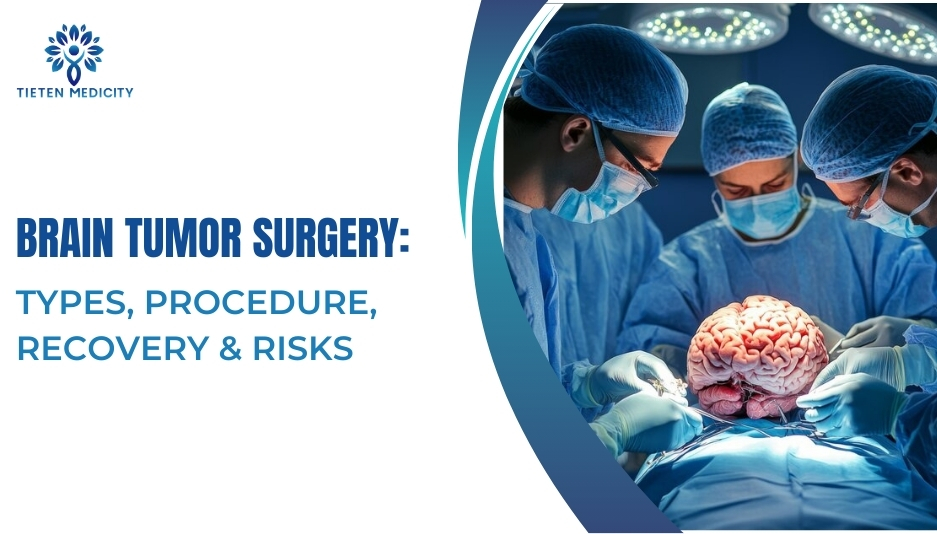
Brain tumor is a serious problem and often requires large medical treatment to completely control and cure it. Brain tumor surgery involving advanced neurosurgical techniques helps the patient recover completely and lead a normal life. At Tieten Medicity, an expert team of best neurosurgeons in Thane understand each patient’s condition and perform a safe and right procedure.
The choice of clinical method relies on the type, size, location and overall health of the sufferer. General surgical options include:
Craniotomy: In a normal human body, removing part of the skull to reach the tumor is the most common procedure for tumors located in the right area.
Minimum Invasive Surgery: Techniques such as keyhole surgery or endoscopic processes allow surgeons to remove tumors through small incisions, reduce recovery time and reduce scarring.
Stereotactic radiosurgery: A non-invasive method that uses radiation beams centered to the target and shrinking for incompatible or deep seated tumors.
Awake brain surgery: When the patient is awake to monitor the functions of the brain, it is performed, ensuring that important areas are not damaged during tumor removal
Brain tumor surgery usually includes the following stages:
Preoperative evaluation: Imaging tests such as MRI or CT scan to determine the size and location of the tumor.
Anesthesia: General anesthesia is managed to insure that the patient does not feel any discomfort or pain during the procedure.
Surgical method: The doctor makes a scratch on the skull and removes a portion of the skull to reach the tumor.
Tumor removal: The tumor is carefully stimulated and the surrounding healthy tissue can be protected to maintain the function of the brain.
Last process: The skull is replaced and the face is closed with stitches or staples.
In some cases, additional treatment such as chemotherapy or radiation therapy may follow to target any remaining cancer cells.
The recovery after surgery varies depending on the complexity of the person and the process:
Living in the hospital: Patients can stay in the hospital for several days to monitor complications.
Physical rehabilitation: Physical therapy may be recommended to help reconstruct strength and coordination.
Follow Care: Regular check-up and imaging test tumors are required for monitoring for recovery.
Most patients can resume normal activities within a few weeks, although complete recovery may take several months.
Regular imaging tests:
Periodic MRI or CT scan tumors help monitor for recovery and assess brain treatment.
Neurological assessment:
Regular checking with neurosurgeons to evaluate speech, memory, movement and overall brain function.
Medications Management:
Continuous use of prescribed medication to control pain, stop seizures and reduce brain inflammation.
Physical and Occupational Therapy:
Medical programs adapted to help strength, balance, coordination and restoration of daily life activities.
Lifestyle adjustment:
Relax to support diet, guidance on exercise, and recovery and improve overall welfare.
Emotional support:
The surgical experts provide psychological counselling services to help in effective removal and speedy recovery.
Generally, brain tumor surgery is very safe but as with all surgeries, there are some risks involved.
Infection: Post operative sickness may happen on the site or within the brain.
Bleeding: Too much bleeding during or later may need additional mediation.
Neurological lack: Damage to the around brain tissues can lead to trouble with speech, movement or memory.
Cerebral edema: There may be a problem of swelling in the brain and other types of problems may start
Anesthesia-related problem: reactions to anesthesia can sometimes occur, it’s common ..
Blood clots: Increase the risk of deep vein thrombosis (DVT) or pulmonary embolism postsurgery.
It is important for patients to discuss these risks with their neurosurgeons to understand potential results and safety measures.
Brain tumor surgery is a critical yet effective treatment that can expand life and improve well being. With expert neurosurgeons, advanced technology and supportive care, at Tieten Medicity Hospital ensures safe results and full recovery for patients facing tumors.
Yes, some brain tumours can be cured, especially if found early and treated properly.
They form when brain cells grow abnormally. The exact cause is often unknown.
Yes, stage 1 brain tumours are often curable with timely treatment.
They can occur at any age when cells in the brain start growing uncontrollably.
No. A brain tumour can be benign or malignant. Brain cancer means it’s malignant.
© 2026, TIETEN MEDICITY. All Rights Reserved.